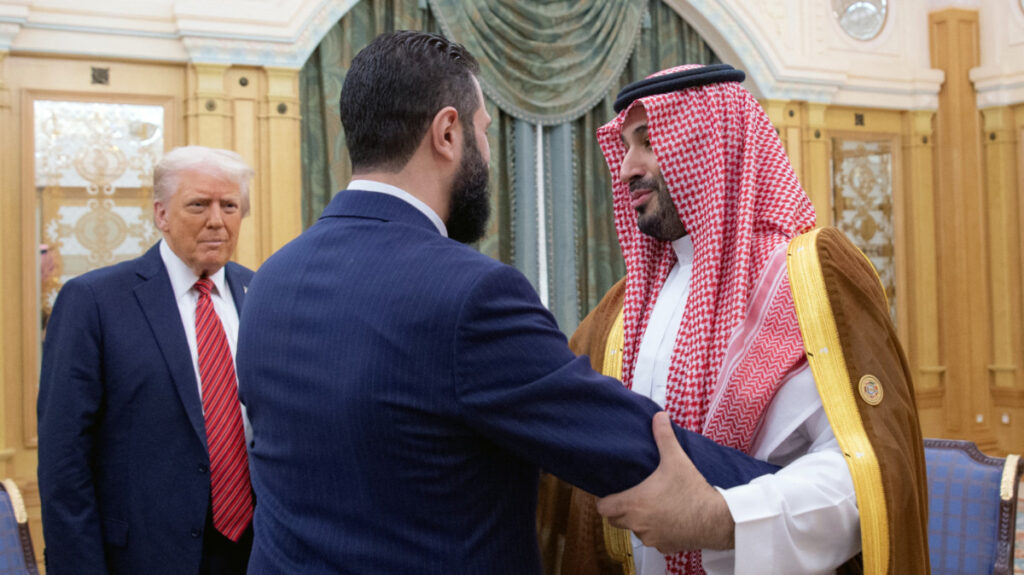Saudi Arabia told the US that Syrian security forces should be allowed to deploy to the country’s restive south despite Israeli objections, a US official told Middle East Eye.
The official, who requested anonymity due to sensitivities around the topic, said that Saudi Arabia’s Foreign Minister Prince Faisal bin Farhan Al Saud told US Secretary of State Marco Rubio on Thursday that the kingdom supported Syria’s military asserting control in the southern Syrian province of Sweida.
A readout of the call provided by the State Department said the two sides “discussed regional security matters, including efforts to end the violence in Syria”.
It did not provide further details.
The US official briefed on the call, and a second source familiar with the diplomacy, told MEE on Friday that the kingdom was “angry” about Israel attacking Syrian soldiers and dictating military deployments to Damascus.
New MEE newsletter: Jerusalem Dispatch
Sign up to get the latest insights and analysis on
Israel-Palestine, alongside Turkey Unpacked and other MEE newsletters
Sweida has been the site of sectarian violence between the majority Druze community and Sunni Bedouins. After bloody fighting broke out on Sunday, the Syrian government deployed troops to Sweida at the request of local authorities, prompting Israel to launch severe strikes against the Syrian army.
Israeli Prime Minister Benjamin Netanyahu then ordered Syria’s government not to deploy troops south. When President Ahmed al-Sharaa did, Israel launched strikes on Syrian military convoys.
On Wednesday, Israel bombed the Syrian defence ministry and areas near the presidential palace.
Current and former US, Arab and Israeli officials told MEE that Netanyahu was seeking to carve out a zone of influence in southern Syria, a development that was unnerving the US’s Arab allies and Turkey.
In an about-turn on Friday, Israeli media reported, citing an unnamed Israeli official, that it had decided to “allow” the “limited entry” of internal Syrian security forces into Sweida for 48 hours.
‘Crystal clear’
A separate US official in the region who has been monitoring the Israeli strikes about the change in Israeli posture, told MEE that Israel’s push for a zone of influence in Syria’s south clashed with a unitary, central Syria that Trump’s envoy to the country, and ambassador to Turkey, Tom Barrack, laid out just last week to reporters.
“I think Potus and others in the administration have been crystal clear about the path for Syria,” the official said, referring to President Trump.

Turkey doesn’t have many options against Israel in Syria
Read More »
A second regional source told MEE that the US was upset about the Israeli strikes.
Israel’s intervention in Sweida has been especially inconvenient to the Trump administration because it comes as the US is pushing the Kurdish-led Syrian Democratic Forces (SDF) to submit to Damascus’s authority.
The US and SDF were allies fighting against the Islamic State militant group, but now Washington wants the Kurdish-led forces to integrate into the Syrian army, as opposed to maintaining an autonomous zone in the northeast.
Sharaa, a former leader of Hay’at Tahrir al-Sham and before that al-Qaeda’s Syrian branch, led the removal of the country’s former president and strongman, Bashar al-Assad, in December 2024.
Saudi Arabia, Turkey, Egypt, Jordan, the United Arab Emirates, and other Arab states issued a statement on Thursday reaffirming their “unwavering support for Syria’s security, unity, stability and sovereignty”.
The statement said Israel’s strikes were a “flagrant assault on Syria’s sovereignty” and that they rejected “all forms of foreign intervention in its [Syrian] internal affairs”.
‘Vested in Sharaa’
Saudi Arabia’s decision to back Sharaa and assert military authority in Sweida is not surprising. The kingdom hosted a direct meeting between the Syrian president and Trump in Riyadh in May.
Trump said that Turkish President Recep Tayyip Erdogan and Crown Prince Mohammed bin Salman were responsible for convincing him to terminate all sanctions on Syria, again in opposition to what diplomats say Israel preferred.

With Damascus strikes, Israel seeks to tear up Trump’s vision for Syria
Read More »
Farhan also spoke with his Turkish counterpart, Hakan Fidan, on Wednesday.
While Gulf states like Saudi Arabia and Qatar have the funds to support Syria’s reconstruction, Sharaa enjoys close ties to Ankara. In April, Israel bombed several Syrian air bases that Turkey was planning to take over to train Sharaa’s security forces.
“Saudi Arabia is vested in Syrian stability and reconstruction. That includes in Sharaa,” the US official told MEE.
This all comes as Trump says he still wants to broker a normalisation agreement between the US’s two partners.
MEE was the first to report that Saudi Arabia lobbied Trump to stop attacks on Yemen’s Houthis in May. Trump’s decision to do so was widely seen as going against Israel.

